
CHINESE JOURNAL OF ANALYTICAL CHEMISTRY
Scope & Guideline
Unveiling New Horizons in Chemical Analysis
Introduction
Aims and Scopes
- Analytical Method Development:
Focus on the creation and optimization of new analytical methodologies, including chromatography, mass spectrometry, and electrochemical sensing techniques. - Environmental and Food Safety Analysis:
Research addressing the detection and quantification of pollutants, toxins, and residues in environmental samples and food products, ensuring safety and compliance with health regulations. - Biochemical and Clinical Applications:
Application of analytical techniques in biochemistry and clinical diagnostics, including the analysis of biomarkers, drugs, and metabolites in biological samples. - Nanomaterials and Sensor Technology:
Exploration of nanomaterials for enhancing the sensitivity and selectivity of sensors and analytical methods, promoting advancements in detection technologies. - Metabolomics and Systems Biology:
Integration of analytical chemistry with metabolomics to understand complex biological systems and metabolic pathways, contributing to health and disease research. - Machine Learning and Data Analysis in Chemistry:
Utilization of machine learning and chemometric techniques to analyze complex data sets, improve analytical methods, and enhance predictive modeling in analytical chemistry.
Trending and Emerging
- Advanced Nanotechnology in Sensing:
There is a growing emphasis on the application of nanotechnology to improve sensor performance, including the use of nanomaterials for enhanced detection capabilities in various applications. - Integration of AI and Machine Learning:
The incorporation of artificial intelligence and machine learning techniques in analytical chemistry research is on the rise, facilitating data analysis, method optimization, and predictive modeling. - Environmental Monitoring and Green Chemistry:
Research focused on environmental monitoring and the development of green analytical methods is increasingly prominent, reflecting global priorities on sustainability and environmental protection. - Bioanalytical Techniques for Clinical Applications:
There is an emerging trend towards the development of bioanalytical methods for clinical diagnostics, particularly in the detection of disease biomarkers and therapeutic drug monitoring. - Metabolomics and Systems Biology Approaches:
The integration of metabolomics with analytical chemistry is becoming a significant area of interest, aiding in the understanding of metabolic pathways and their implications in health and disease.
Declining or Waning
- Traditional Analytical Techniques:
There is a noticeable decrease in studies focusing solely on conventional analytical methods such as basic spectrophotometry and titration, as researchers increasingly gravitate toward more advanced and integrated techniques. - Single-Use Sensors:
Research on disposable or single-use sensors has diminished, possibly due to the growing interest in reusable and more sustainable sensor technologies. - Basic Chemical Education Topics:
Papers centered on fundamental teaching methods and basic laboratory techniques in analytical chemistry are becoming less common, indicating a shift towards more applied and research-focused studies in the field.
Similar Journals
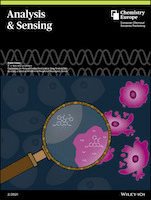
Analysis & Sensing
Unveiling Insights Through Precision AnalysisAnalysis & Sensing is a prominent academic journal published by WILEY-V C H VERLAG GMBH, focusing on the critical fields of Analytical Chemistry, Electrochemistry, Spectroscopy, and Biochemistry. Established within the converged years from 2021 to 2024, the journal aims to advance knowledge in analytical and sensing techniques, providing a platform for high-quality research that reflects current trends and challenges in the scientific community. With a Scopus ranking that highlights its credibility—ranking 101st in Analytical Chemistry and 43rd in Electrochemistry—the journal caters to researchers, professionals, and students striving to enhance their understanding of analytical processes and methodologies. Although not open access, the quality of the articles published ensures a rigorous peer-review system, making it a vital resource for those who wish to remain at the forefront of research innovation in analytical sciences. Additionally, its global reach, indicated by its effective dissemination and relevance, underscores the journal's significance within the realm of chemical research.

JOURNAL OF ANALYTICAL CHEMISTRY
Innovating Insights in Analytical ChemistryJOURNAL OF ANALYTICAL CHEMISTRY, published by PLEIADES PUBLISHING INC, stands as a pivotal resource in the field of analytical chemistry, offering an innovative platform for researchers, professionals, and students to advance their knowledge and contribute to the discourse within the discipline. With an ISSN of 1061-9348 and an E-ISSN of 1608-3199, this journal features a focused exploration of analytical methodologies, instrumentation developments, and applications across various domains, contributing to practical and theoretical advancements in the field. Currently ranked in the Q3 category in Analytical Chemistry with a Scopus rank of #111 out of 156, it provides critical insights and innovation strategies for professionals aiming to enhance their analytical capabilities. Access to the journal is through standard subscription models, and it covers an extensive range of topics pertinent to the discipline from 1996 to 2024. Engage with the JOURNAL OF ANALYTICAL CHEMISTRY to be part of a vibrant research community dedicated to push the boundaries of analytical practices.

MICROCHEMICAL JOURNAL
Illuminating the Path of Spectroscopic DiscoveriesMicrochemical Journal, published by Elsevier, stands as a leading scholarly publication in the fields of Analytical Chemistry and Spectroscopy, boasting impressive rankings of Q1 and Q2 in their respective categories for 2023. With an H-index reflecting its substantial impact and relevance, this journal has been a cornerstone of research dissemination since its inception in 1957, and it continues to play a vital role in advancing the methodological and technological innovations within these disciplines. The journal presents peer-reviewed articles that explore a wide array of topics, making it an essential resource for researchers, professionals, and students keen on the latest advancements in microchemical processes and techniques. Although it does not currently offer open access options, its publication through Elsevier ensures a high standard of academic integrity and wide accessibility through various academic institutions. With a strong Scopus ranking—9th in Chemistry Spectroscopy and 22nd in Analytical Chemistry—Microchemical Journal is an indispensable platform for empirical studies, insightful reviews, and pioneering methodologies in the microchemical domain.
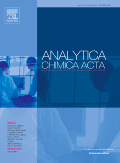
Analytica Chimica Acta
Unveiling the future of analytical chemistry research.Analytica Chimica Acta is a prestigious peer-reviewed journal published by ELSEVIER, renowned for its significant contribution to the fields of analytical chemistry, biochemistry, environmental chemistry, and spectroscopy. Established in 1947, this journal has solidified its reputation, reflected in its impressive impact factors and Scopus rankings, including a Q1 classification in Analytical Chemistry and Spectroscopy, and a Q2 ranking in both Biochemistry and Environmental Chemistry. With its comprehensive scope, Analytica Chimica Acta aims to publish innovative research, critical reviews, and technical notes that advance the understanding and application of analytical methods. As an essential resource for researchers, professionals, and students alike, it encourages the dissemination of high-quality research that addresses contemporary challenges in chemical analysis and promotes interdisciplinary collaboration. While the journal operates primarily on a subscription basis, it also offers unique opportunities for authors to reach a broad audience and engage in the global scientific discourse.
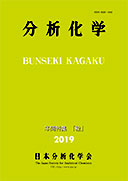
BUNSEKI KAGAKU
Fostering Innovation in Scientific InquiryBUNSEKI KAGAKU, published by the Japan Society Analytical Chemistry, is a reputable journal dedicated to the field of analytical chemistry. With an ISSN of 0525-1931, this journal has been a crucial outlet for scholarly communication since its inception in 1952, converging its publication years from 1954 to 1957 and from 1959 to 2024. Although it holds a Q4 category ranking in the most recent 2023 quartiles of analytical chemistry and ranks 153/156 in Scopus, it continues to serve as a platform for quality research, fostering advancements in the field. BUNSEKI KAGAKU is based in Tokyo, Japan, and emphasizes the critical importance of analytical techniques in scientific inquiry. With a commitment to professionalism and rigor, the journal provides a vital resource for researchers, students, and professionals seeking to explore innovative methodologies and contribute to the ongoing dialogue in analytical chemistry.
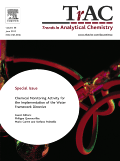
TRAC-TRENDS IN ANALYTICAL CHEMISTRY
Transforming Research into Impactful SolutionsTRAC - Trends in Analytical Chemistry is a prestigious journal published by Elsevier Science Ltd, situated in the Netherlands. With an impressive impact factor reflected in its Q1 rankings across three major categories—Analytical Chemistry, Environmental Chemistry, and Spectroscopy—this journal stands at the forefront of disseminating pioneering research and advancements in the field of analytical chemistry. Established in 1981, TRAC provides a comprehensive platform for researchers to share influential studies and insights related to the latest trends, methodologies, and technologies in analytical techniques. Recognized globally, the journal excels in fostering cross-disciplinary dialogue and innovation, making it an indispensable resource for academics, professionals, and students alike. Explore the latest issues to stay abreast of cutting-edge developments that shape the analytical sciences.

Analytical Science and Technology
Empowering researchers to share transformative findings.Analytical Science and Technology is a prominent journal dedicated to advancing the fields of analytical chemistry and technology, published by the Korean Society for Analytical Science. Based in South Korea, this journal serves as a vital platform for researchers, professionals, and students committed to exploring innovative analytical techniques and methodologies. Although it is classified under Q4 in various subject categories, including Agronomy and Crop Science, Environmental Chemistry, and Pharmacology, the journal aims to provide critical insights and contributions to the scientific community. With ISSN 1225-0163 and E-ISSN 2288-8985, it spans a converged timeline from 2019 to 2024. Despite its current standings in Scopus rankings, the journal is dedicated to improving its visibility and impact through rigorous peer review and high-quality publications, fostering knowledge sharing within its diverse academic fields. Researchers looking for a reliable outlet for their findings are encouraged to consider this journal as it continues to strive for excellence in analytical science.

LCGC North America
Bridging Research and Application in Analytical ChemistryLCGC North America is a pivotal resource in the field of Analytical Chemistry, published by MJH Life Sciences. Since its inception in 1999, the journal has strived to bridge the gap between scientific research and practical applications, catering to a diverse audience that includes researchers, professionals, and students interested in chromatography and related analytical practices. Although currently categorized in the Q4 quartile of Analytical Chemistry, with a Scopus rank of #137 out of 156, LCGC North America is dedicated to delivering insightful articles that foster discussion and innovation within the analytical chemistry community. With a commitment to quality content, the journal covers a broad spectrum of topics, ensuring that readers remain informed about the latest developments and trends in the field. Despite its non-open access model, readers can access its valuable resources through institutional subscriptions and various library networks, making it a vital asset for those engaged in cutting-edge research and practice. Located in Cranbury, NJ, United States, LCGC North America continues to contribute significantly to the advancement of analytical methodologies and technologies.
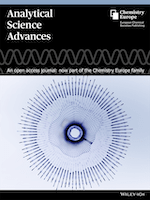
Analytical Science Advances
Leading the Charge in Analytical Method DevelopmentAnalytical Science Advances is a dynamic journal published by WILEY, dedicated to the ever-evolving field of analytical chemistry. With an ISSN of 2628-5452, this open-access platform aims to disseminate high-quality research and insightful reviews that push the boundaries of analytical methodologies and instrumentation. Since its inception in 2020, the journal has gained traction, securing a commendable Q2 ranking in 2023 within its category, highlighting its significance in the scientific community. Currently positioned at Rank #68 out of 156 in Scopus' analytical chemistry category, it boasts a 56th percentile ranking, reflecting its contributions to advancing analytical techniques. Researchers, professionals, and students will find this journal an invaluable resource for keeping abreast of the latest developments, emerging technologies, and innovative approaches in analytical science, ensuring the journal's relevancy and influence in shaping future discoveries.

Journal of Analysis and Testing
Exploring the forefront of analytical methodologies.Journal of Analysis and Testing is a premier academic journal published by SPRINGER SINGAPORE PTE LTD, dedicated to advancing the fields of analytical and environmental chemistry. With ISSN 2096-241X and E-ISSN 2509-4696, the journal has established a significant presence since its inception in 2017, converging its focus until 2024. The journal's outstanding rankings in 2023, including Q1 quartile placements in Analytical Chemistry, Instrumentation, and Spectroscopy, underscore its pivotal role in disseminating high-quality research. Researchers can access cutting-edge studies that explore innovative testing methodologies, electrochemical analyses, and material evaluations, making it an essential resource for professionals and students alike. The Journal of Analysis and Testing not only celebrates advances in science and technology but also promotes interdisciplinary collaborations, ensuring widespread impact across analytical and environmental domains. As such, this journal plays a vital role in shaping the future of analytical practices and methodologies, positioning itself as a key conduit for knowledge exchange in the scholarly community.